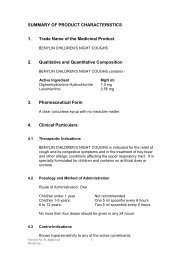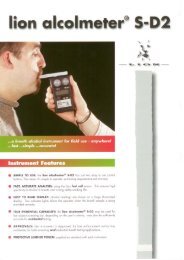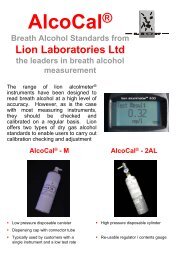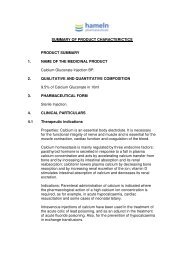Naproxen 250mg and 500mg tablets - DM Wood Medical
Naproxen 250mg and 500mg tablets - DM Wood Medical
Naproxen 250mg and 500mg tablets - DM Wood Medical
You also want an ePaper? Increase the reach of your titles
YUMPU automatically turns print PDFs into web optimized ePapers that Google loves.
<strong>Naproxen</strong> <strong>250mg</strong> <strong>and</strong> <strong>500mg</strong> <strong>tablets</strong><br />
Pharmacode<br />
Position<br />
Read this leaflet carefully before you start to<br />
take this medicine.<br />
• Keep this leaflet. You may need to read it again.<br />
• If you have any further questions, ask your<br />
doctor or pharmacist.<br />
• This medicine has been prescribed for you. Do<br />
not pass it on to others. It may harm them, even<br />
if their symptoms are the same as yours.<br />
• If any of the side effects get serious, or if you<br />
notice any side effects not listed in this leaflet,<br />
please tell your doctor or pharmacist.<br />
In this leaflet:<br />
1. What <strong>Naproxen</strong> <strong>tablets</strong> are <strong>and</strong><br />
what they are used for<br />
2. Before you take <strong>Naproxen</strong> <strong>tablets</strong><br />
3. How to take <strong>Naproxen</strong> <strong>tablets</strong><br />
4. Possible side effects<br />
5. How to store<br />
6. Further information<br />
1. What <strong>Naproxen</strong> <strong>tablets</strong> are <strong>and</strong> what they are<br />
used for<br />
<strong>Naproxen</strong> belongs to a group of medicines called non-steriodal<br />
anti-inflammatory drugs (NSAIDs), which are used to reduce<br />
inflammation <strong>and</strong> pain in joints <strong>and</strong> muscles.<br />
<strong>Naproxen</strong> <strong>tablets</strong> are used to treat:<br />
• diseases of joints such as rheumatoid arthritis, osteoarthritis,<br />
ankylosing spondylitis. <strong>Naproxen</strong> cannot cure arthritis but<br />
is used to give relief of some symptoms such as inflammation,<br />
swelling, stiffness <strong>and</strong> joint pain.<br />
• attacks of gout<br />
• muscle <strong>and</strong> bone disorders such as cervical spondylitis, low<br />
back pain, strains <strong>and</strong> sprains, muscular pain <strong>and</strong> stiffness<br />
(fibrositis) <strong>and</strong> inflammation of tendons (tenosynovitis).<br />
2. Before you take <strong>Naproxen</strong> <strong>tablets</strong><br />
Do not take <strong>Naproxen</strong> <strong>tablets</strong> if you:<br />
• are in the last three months of pregnancy or if you are<br />
breast -feeding<br />
• are allergic to naproxen or to any of the other ingredients of<br />
<strong>Naproxen</strong> <strong>tablets</strong> (see section 6)<br />
• are allergic to aspirin or other non-steroidal antiinflammatory<br />
medicines (NSAIDs), or you have developed signs<br />
of asthma (wheezing), runny nose, swelling of the skin or rash<br />
when taking these medicines<br />
• have or have had stomach or duodenum (gut) ulcers, bleeding<br />
in the stomach or intestines (gastrointestinal bleeding) or have<br />
had two or more episodes of peptic ulcers, stomach bleeding or<br />
perforation<br />
• have severe liver, kidney (not receiving dialysis) or heart failure<br />
If you are not sure about any of the above conditions, please ask<br />
your doctor.<br />
Check with your doctor before taking <strong>Naproxen</strong> <strong>tablets</strong><br />
if you:<br />
• use other non-steroidal anti-inflammatory medicines (NSAIDs) or<br />
any medication which may cause bleeding or ulcers in the stomach<br />
• have a history of gastrointestinal disease e.g. ulcerative colitis,<br />
Crohn’s disease<br />
• are elderly<br />
• have or have had high blood pressure or any liver, kidney or<br />
heart problems<br />
• have or have had bronchial asthma or allergic disease<br />
• have systemic lupus erythematosus or other connective tissue<br />
disorders<br />
• are a women trying to become pregnant or undergoing<br />
investigation of infertility.<br />
Other warnings<br />
• Medicines such as naproxen may be associated with a small<br />
increased risk of heart attack (myocardial infaraction) or<br />
stroke. Any risk is more likely with high doses <strong>and</strong> prolonged<br />
treatment. Do not exceed the recommended dose or duration of<br />
treatment.<br />
• If you have heart problems, previous stroke or think that you<br />
might be at risk of these conditions (for example if you have<br />
high blood pressure, diabetes or high cholesterol or are a<br />
smoker) you should discuss your treatment with your doctor or<br />
pharmacist.<br />
• If you are elderly or frail, you have a higher risk of getting<br />
side effects, especially from the stomach. If you experience any<br />
unusual symptoms from the stomach you must tell your doctor<br />
about it.<br />
• <strong>Naproxen</strong> <strong>tablets</strong> may hide the symptoms of an infection.<br />
Taking other medicines.<br />
Please tell your doctor or pharmacist if you are taking, or have<br />
recently taken, any other medicines, including medicines obtained<br />
without a prescription. Especially:<br />
• other NSAIDs such as aspirin or COX II inhibitors<br />
• medicines which thin the blood or which prevent blood clotting<br />
such as warfarin<br />
• corticosteroids<br />
• diuretics (“water <strong>tablets</strong>”) (e.g. furosemide)<br />
• medicines to treat high blood pressure (e.g. captopril, ramipril<br />
or propranolol)<br />
• ciclosporin or tacrolimus<br />
• mifepristone – do not take NSAIDs 8-12 days after mifepristone<br />
• SSRI antidepressants<br />
• zidovudine<br />
• quinolone antibiotics<br />
• probenecid<br />
• methotrexate<br />
• lithium<br />
• hydantoins<br />
• sulphonamides<br />
• sulphonylureas<br />
• cardiac glycosides (e.g. digoxin or digitoxin).<br />
Pregnancy <strong>and</strong> breast-feeding<br />
<strong>Naproxen</strong> may make it more difficult to become pregnant. You<br />
should inform your doctor if you are planning to become pregnant<br />
or if you have problems becoming pregnant.<br />
You should not take <strong>Naproxen</strong> in the first 6 months of pregnancy<br />
<strong>and</strong> must not take <strong>Naproxen</strong> in the last 3 months of pregnancy or<br />
during labour.<br />
If you are breast-feeding, you should not take <strong>Naproxen</strong> <strong>tablets</strong>.<br />
Continued top of next column<br />
50210831 Continued over page
Driving <strong>and</strong> using machines<br />
<strong>Naproxen</strong> may make you feel dizzy, drowsy or tired <strong>and</strong> may cause<br />
blurred vision. Make sure you are not affected before you drive or operate<br />
machinery.<br />
Sugar intolerance<br />
If you have been told by your doctor that you have an intolerance to some<br />
sugars, contact your doctor before taking this medicine, as it contains<br />
lactose.<br />
Tests<br />
If you need any blood or urine tests tell your doctor you are taking<br />
<strong>Naproxen</strong> <strong>tablets</strong>. The <strong>tablets</strong> may need to be stopped 48 hours before a<br />
test, as they may interefere with the results.<br />
3. How to take <strong>Naproxen</strong> <strong>tablets</strong><br />
Always take <strong>Naproxen</strong> <strong>tablets</strong> exactly as your doctor has told you. If you<br />
are not sure, check with your doctor or pharmacist.<br />
Swallow with or after food.<br />
Dose<br />
Your doctor should prescribe as low a dose as possible. This will reduce any<br />
side effects you may experience.<br />
Adults<br />
• Rheumatoid arthritis, osteoarthritis <strong>and</strong> ankylosing spondylitis<br />
Initially a dose of 750mg-1g may be given then <strong>500mg</strong>-1g a day in<br />
two doses at twelve hour intervals, or as one dose taken in either the<br />
morning or evening.<br />
• Attack of gout<br />
Initially 750mg as a single dose then <strong>250mg</strong> every 8 hours until the<br />
attack has passed.<br />
• Muscle <strong>and</strong> bone disorders<br />
Initially <strong>500mg</strong> as a single dose then <strong>250mg</strong> every 6-8 hours as<br />
necessary. Up to a maximum of 1<strong>250mg</strong> a day may be given after the<br />
first day.<br />
Children under 16 years<br />
<strong>Naproxen</strong> <strong>tablets</strong> should not be used in children under 16 years of age.<br />
Elderly<br />
Dosage may be reduced in the elderly.<br />
If you take more <strong>Naproxen</strong> <strong>tablets</strong> than you should<br />
It is important not to take too many <strong>tablets</strong>. Contact your doctor,<br />
pharmacist or nearest hospital casualty department immediately if you<br />
have taken more <strong>tablets</strong> than you should.<br />
Symptoms of overdose are headache, feeling or being sick, heartburn,<br />
diarrhoea, disorientation, bleeding of the stomach or intestines,<br />
unconsciousness, drowsiness, dizziness, ringing or buzzing in the ears,<br />
fainting, fits <strong>and</strong> excitation.<br />
If you forget to take <strong>Naproxen</strong> <strong>tablets</strong><br />
If you forget to take your <strong>tablets</strong>, take your next dose as soon as you<br />
remember, unless it is nearly time for your next dose. Do not take a double<br />
dose to make up for one you have missed.<br />
4. Possible side effects<br />
Like all medicines, <strong>Naproxen</strong> <strong>tablets</strong> can cause side effects, although<br />
not everybody gets them. If any of the side effects get worse, or if you<br />
notice any side effects not listed in this leaflet, please tell your doctor or<br />
pharmacist.<br />
Stop taking <strong>Naproxen</strong> <strong>tablets</strong> <strong>and</strong> contact your doctor immediately<br />
if you<br />
• develop stomach or intestinal ulcers or bleeding, indigestion, heartburn<br />
or abdominal pain (pains in your stomach) or other abnormal stomach<br />
symptoms<br />
• Pass blood in your faeces (stools/motions)<br />
• Pass black tarry stools<br />
• Vomit any blood or dark particles that look like coffee grounds.<br />
Tell your doctor if you notice any of the following side effects<br />
• Allergic reaction: an itchy skin rash, blood spots, bruising or<br />
discolouring of the skin, red patches (erythema multiforme), a severe<br />
rash with reddening, peeling <strong>and</strong> swelling of the skin that resembles<br />
burns (epidermal necrolysis), or any other severe reactions like swelling<br />
of the face, mouth, tongue or airways, feeling <strong>and</strong> being sick , difficulty<br />
breathing or wheezing.<br />
• Nervous system: fits, headache, ringing in the ears, a spinning<br />
sensation, difficulty concentrating <strong>and</strong> sleeping, inflammation of the<br />
optic nerve, disturbed vision, tingling or“pins <strong>and</strong> needles”, depression,<br />
confusion, sensing things that are not there, dizziness, feeling of<br />
general discomfort <strong>and</strong> illness, tiredness, drowsiness, aseptic meningitis<br />
(may cause fever, feeling or being sick, disorientation, headache, neck<br />
stiffness <strong>and</strong> light intolerance).<br />
• Skin: rashes which may be red, itchy or blisters, hair loss, swelling of<br />
the face or body, sensitivity of the skin to light, severe skin rash with<br />
flushing, fever, blisters or ulcers (Stevens-Johnson syndrome).<br />
• Heart: water retention, increased blood pressure <strong>and</strong> heart failure.<br />
• Liver: abnormal liver function, hepatitis <strong>and</strong> jaundice (yellow skin or<br />
eyes).<br />
• Stomach <strong>and</strong> intestines: stomach, duodenal or intestinal bleeding,<br />
ulcers or perforation, feeling or being sick, diarrhoea, wind, constipation,<br />
inflammation of the stomach lining (gastritis), worsening of colitis <strong>and</strong><br />
Crohn’s disease.<br />
• Blood: changes in the numbers <strong>and</strong> types of blood cells<br />
(if you develop sore throats, nose bleeds or infections<br />
consult your doctor).<br />
• Kidneys: kidney damage or failure <strong>and</strong> blood in the urine.<br />
• Other: hearing difficulties, swelling of the h<strong>and</strong>s <strong>and</strong><br />
feet, lung damage, high blood potassium levels, mouth<br />
ulcers, inflammation of blood vessels, inflammation of the<br />
pancreas (pancreatitis).<br />
• Medicines such as naproxen may be associated with a<br />
small increased risk of heart attack (myocardial infarction)<br />
or stroke.<br />
If any of the side effects get worse, or if you notice any side<br />
effects not listed in this leaflet, please tell your doctor or<br />
pharmacist.<br />
5. How to store<br />
Keep out of the reach <strong>and</strong> sight of children.<br />
Store below 25ºC in a dry place. Protect from light.<br />
Do not use <strong>Naproxen</strong> <strong>tablets</strong> after the expiry date which is<br />
stated on the label/carton/bottle. The expiry date refers to<br />
the last day of that month.<br />
Medicines should not be disposed of via wastewater or<br />
household waste. Ask your pharmacist how to dispose of<br />
medicines no longer required. These measures will help to<br />
protect the environment.<br />
6. Further information<br />
What <strong>Naproxen</strong> <strong>tablets</strong> contain<br />
• The active substance (the ingredient that makes the<br />
medicine work) is naproxen. Each tablet contains either<br />
<strong>250mg</strong> or <strong>500mg</strong> of the active substance.<br />
• The other ingredients are lactose, magnesium stearate,<br />
maize starch, polyvidone, E172, E463.<br />
What <strong>Naproxen</strong> <strong>tablets</strong> look like <strong>and</strong> contents of<br />
the pack<br />
<strong>Naproxen</strong> <strong>tablets</strong> are yellow, uncoated <strong>tablets</strong>.<br />
Marketing Authorisation Holder <strong>and</strong> Manufacturer<br />
Actavis, Barnstaple, EX32 8NS, UK.<br />
This leaflet was last revised in September 2008<br />
Pharmacode<br />
Position<br />
Continued top of next column<br />
50210831<br />
Actavis, Barnstaple, EX32 8NS, UK


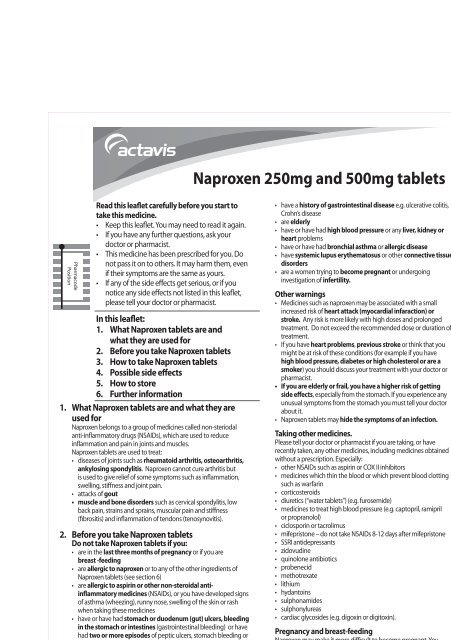
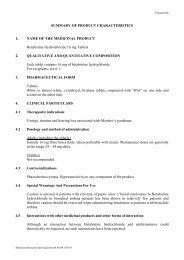
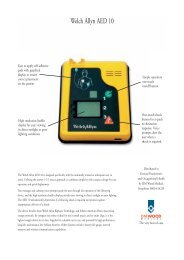

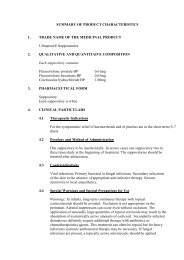

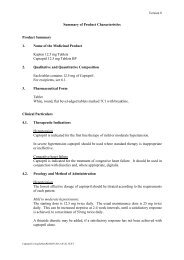
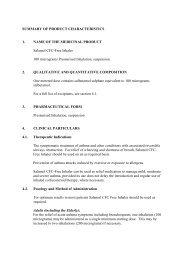
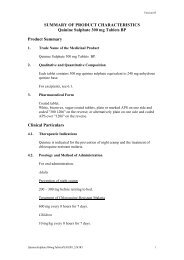


![Metoclopramide tablets 10 mg [spc] - DM Wood Medical](https://img.yumpu.com/36472416/1/184x260/metoclopramide-tablets-10-mg-spc-dm-wood-medical.jpg?quality=85)
